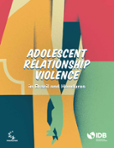Adolescent Relationship Violence in Brazil and Honduras
Date
Sep 2017
EDITOR
Alemann, Clara; Bustelo, Monserrat
There is strong evidence to show that adolescent relationship violence (duringnon-cohabitating relationships of namoro in Portuguese, noviazgo in Spanish) can lead to adult intimate partner violence (IPV). However, research and interventions addressing violence among adolescents are limited compared to those focused on adult IPV, and they are especially scarce in Latin American and Caribbean (LAC) countries. As a result, policies and programs in the region miss out on significant opportunities to promote nonviolent relationships throughout life.
In 2015, Promundo and the Inter-American Development Bank carried out a qualitative study to examine risk and protective factors surrounding adolescent IPV in urban and rural sites of Brazil and Honduras. The teams conducted focus groups and a total of 147 in-depth interviews with girls/young women and boys/young men aged 14 to 24 years. Findings underscore that adolescents generally recognize physical violence as such, but rarely identify or problematize controlling behaviors that were pervasive throughout this research. Rigid and inequitable gender norms around sexuality support sexual and other forms of violence. Norms also discourage intervening in couples’ affairs and seeking help. Reciprocal violence, i.e., the use of IPV by both members of a couple, was especially common among adolescents in the urban Brazilian site, although girls were still more likely to be victims of physical and sexual IPV. Strategies for programs, and research are offered based on the findings.
In 2015, Promundo and the Inter-American Development Bank carried out a qualitative study to examine risk and protective factors surrounding adolescent IPV in urban and rural sites of Brazil and Honduras. The teams conducted focus groups and a total of 147 in-depth interviews with girls/young women and boys/young men aged 14 to 24 years. Findings underscore that adolescents generally recognize physical violence as such, but rarely identify or problematize controlling behaviors that were pervasive throughout this research. Rigid and inequitable gender norms around sexuality support sexual and other forms of violence. Norms also discourage intervening in couples’ affairs and seeking help. Reciprocal violence, i.e., the use of IPV by both members of a couple, was especially common among adolescents in the urban Brazilian site, although girls were still more likely to be victims of physical and sexual IPV. Strategies for programs, and research are offered based on the findings.



